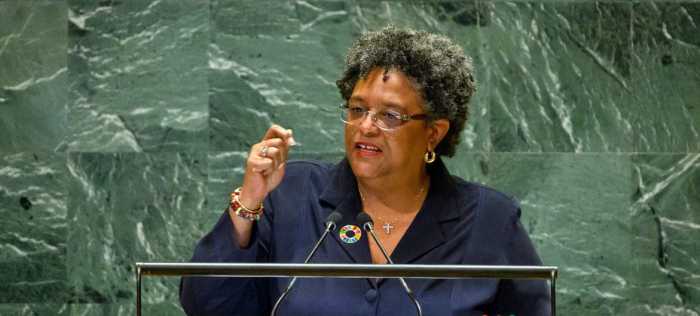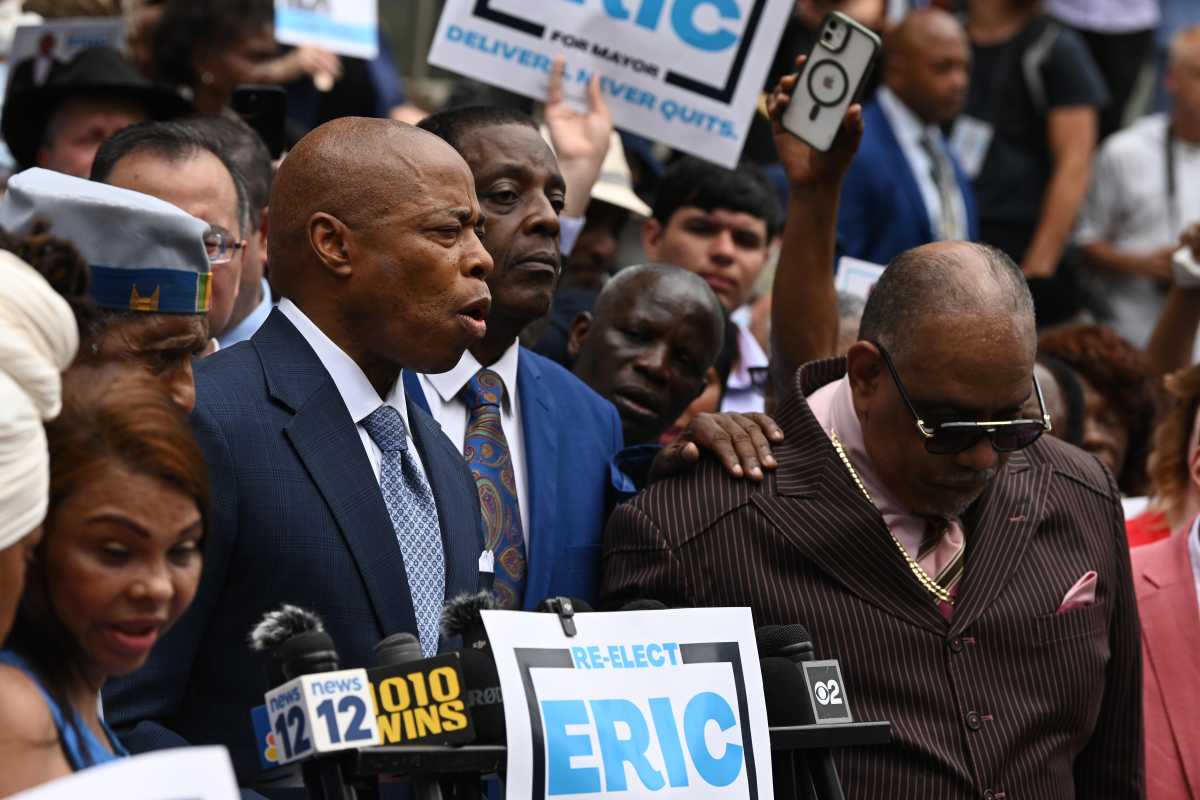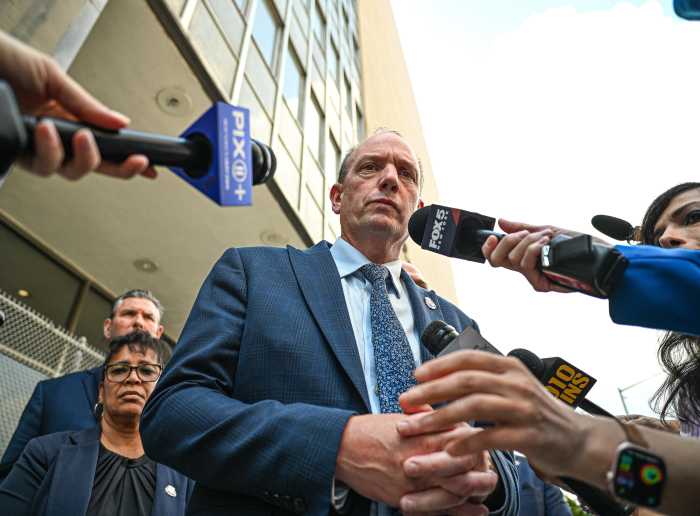Inside a small space in Harlem, fans of Jamaican, music producer Lee “Scratch” Perry huddled recently to watch a film that took more than a decade to fully portray his life’s worth of eccentricities.
Entitled “The Upsetter: The Life & Music of Lee “Scratch” Perry” the film lauding the revered reggae innovator premiered simultaneously in two cities — San Francisco and New York.
Narrated by Benicio Del Toro (who is currently in Cuba on a film project) much of the film integrates low quality, home videos Perry supplied from Perry’s personal archives and incorporates insignificant footage shot from his Swiss residence where he resides with his wife and three children. Introduced by Jamaican, actor Carl Bradshaw, the film depicts 90 minutes of Perry’s idiosyncrasies and persona – an amalgam of rantings, prophesies and irreverent commentaries about colleagues and past associates. The documentary is by and about Perry. Told mostly in his voice, the acclaimed dub innovator reveals him self to be a character disconnected from any average mindset. Mostly, Perry is presented as a performer in perpetual performance mode. He seems to crave attention and an audience. When audiences and cameras appear, Perry delivers fascinating performances that sometimes thrill, alarm or appease reporters and curiosity seekers. Initially in the film he explains his 1936 birthplace to be a place called Kendal, Jamaica. Later on in the biopic he explains his birthplace to be somewhere in the parish of Hanover. His mother, he said was not specific. However, a visit to a district church named Kendal Baptist Church positions his affinity to that community where he may have spent much of his formative years. His birth name he said was Rainford Hugh Perry or Leeburn Perry. There again he injected relative attribution to the various nom de plume he was known before settling with the nickname “Scratch.” He explained it was derived after identifying himself as Lee Burn.
Although much of the subtitled interpretations translate his fast-talking, style of expression, what seems most evident in the biopic is that Perry revels in fire and the act of burning. He enjoys playing with fire. As a matter of fact, throughout the film he spends more time lighting or dousing flames than creating music. An explanation he offers is that fire purifies.
According to the extrovert godfather of reggae his career started when the resort area of Negril was being prepared for high-end tourism. He sought work there driving tractors. According to the 75 year-old, swift-tongued “country boy,” he heard music in the stones piled along the roadside there. Inside the rocks, he said he heard sounds which urged him to pursue a recording career. Although the path from the south coast to Kingston was not fully explained, eventually Perry moved to the capital city and constructed his Black Ark Studios. Footage of solo in-studio sessions, prolonged predilections on HIM Haile Selassie and fire burning rituals provide ample reasons to chuckle at his episodes. More often than not, Perry appears to be performing as a character for a private audience and en vogue for attention rather than delivering a genuine argument to register. He uses rhymes, malapropism and surly metaphors to state his case. Still, his music is given a hearing with his first hit track “People Funny Boy.”
Bob Marley’s “Duppy Conqueror” also finds a space for pontification; and his “Punky Reggae Party” reunion in 1977 is explained to be Perry’s version of Marley’s expression of the genre’s punk roots.
Perry’s career was revived in the 1990s by the Beastie Boys who invited collaboration after his absentia throughout the 1980s. He enjoyed new attention especially from the top-selling hip-hop assembly in the USA.
Perry does not mince his words when talking about elevating Marley Wailers by selling their product to Trojan Records without their knowledge. Although he was rebuked by the composers, he explained in the film that he did Marley and the group a favor by introducing them to English audiences.
“Without me, the world would not know them.”
“There are no Black stars in Jamaica…Marcus Garvey was the only one.”
Perry wishes no good for the reggae group, The Congos. It is the group he blames for helping him to decide to “purify” his recording studio.
To that action he said he regrets allowing negative individuals into his midst. He added that consistent marijuana attributed to some of his eccentric behavior.
The combination of excessive smoking and opening his work space to demons and negative people directly forced him to free himself by burning down his Black Ark recording studios. Perry’s eccentricities are magnified by colorful dyes, clothes and language. Throughout, he is seen painting his hair in brightly colorful shades of red, gold and green.
Exile from a fiery Kingston residence seeking refuge in the icy, snow-covered Swiss respite he now resides perhaps defines the extremes of his existence. He said he has recovered from an alcohol and marijuana addiction. Perry contends he is also a vegetarian. In Switzerland he lives with his second family – a wife, teenaged son and two younger siblings. There, a camera found him living and working at the Blue Ark Studios he renamed to recreate his Jamaica domicile. Although snow surrounds him, Perry is seen building a fire to burn away the white piles of flakes collected around his home. Fire and ice seems to complete Perry’s testament to a unique and different lifestyle.
The film is booked for 30 cities.
“The Upsetter” will open in Brooklyn in June.
According to producer Adam Bhala Lough it will also go directly to iTunes, Video on Demand and DVD later this spring. Only 1,000 copies will be distributed.
Lough spoke at the Harlem premiere after the screening. He said Perry had not seen the entire presentation but commented on portions he had seen that “this is going to be massive.”
He said he spent weeks with the revered “Godfather of reggae” in Europe and considers him an iconic figure in music. Lough said he had grown up listening to Marley and other reggae artists and found Perry one of the most fascinating subjects to focus his lens.
Perry he said will be talking to individuals interested in hearing his opinions of the film made by Ethan Higbee and Adam Bhala Lough.
Keeling Beckford, an archivist of vintage reggae music was instrumental in screening the film at the Harlem locale. Beckford said he collaborated with Perry for 13 years and was pleased with the outcome of the film. He said after the Perry showcase, he will introduce a film on Gregory Isaacs as well as “Birth of Ska,” a definitive retrospect on Jamaica’s first, big, music sensation.
For more information on the film log onto www.theupsettermovie.com























